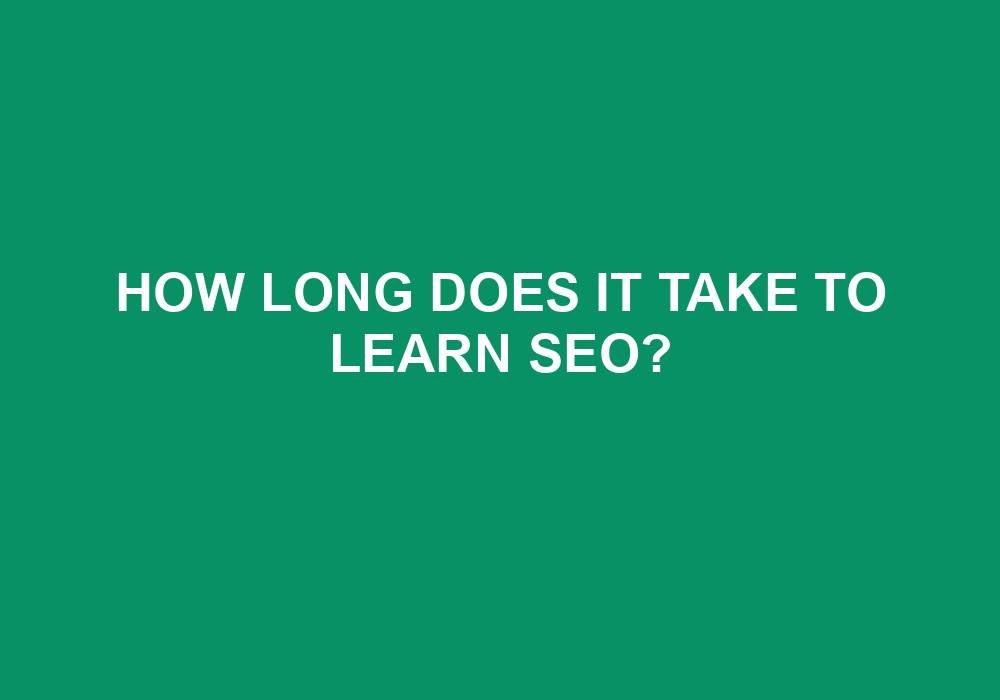If you’re wondering, “How long does it take to learn SEO?” you’ve come to the right place! SEO, or Search Engine Optimization, is a fascinating field that can help websites rank higher on search engine results. But how long does it really take to master this skill? Let’s dive in and find out!
Learning SEO is like embarking on a quest to uncover the secrets of boosting website visibility. It’s a journey where you’ll explore different techniques, algorithms, and strategies. And just like any journey, the time it takes to reach your destination may vary.
So, if you’re eager to become an SEO expert, fasten your seatbelt and get ready for an exciting ride! We’ll explore the different factors that can influence how long it takes to learn SEO and give you some tips to kickstart your learning journey. Let’s get started!
How Long Does It Take to Learn SEO? A Comprehensive Guide to Mastering Search Engine Optimization
Introduction:
SEO, or Search Engine Optimization, is the practice of enhancing a website’s visibility on search engine result pages (SERPs). The world of SEO is complex and ever-evolving, making it difficult to determine how long it takes to become proficient in this field. In this comprehensive guide, we will explore the factors that influence the time it takes to learn SEO and provide valuable tips to expedite your learning process.
The Fundamentals of SEO
SEO encompasses a wide range of strategies and best practices that aim to optimize a website’s content, structure, and technical aspects to rank higher on search engine results pages. To grasp the fundamentals of SEO, it is crucial to understand the three key pillars:
1. Keyword Research and On-Page Optimization: Keyword research is the foundation of SEO. It involves identifying the search terms your target audience uses and strategically incorporating them into your website’s content and meta tags. On-page optimization includes optimizing titles, headings, URLs, and meta descriptions to improve your website’s relevancy and visibility to search engines.
2. Off-Page Optimization and Link Building: Off-page optimization refers to activities performed outside your website to improve its visibility. Link building plays a significant role in off-page optimization, as it helps search engines establish your website’s credibility and authority. Building high-quality backlinks from reputable websites is crucial for improving search engine rankings.
3. Technical SEO: Technical SEO focuses on optimizing the technical aspects of your website, ensuring search engines can crawl, index, and understand your content efficiently. This includes optimizing website speed, using proper header tags, implementing structured data, and creating a mobile-friendly experience.
Benefits of Learning SEO
By mastering SEO, you can unlock a myriad of benefits for yourself or your business. Here are some key advantages:
1. Increased Organic Traffic: SEO helps drive organic traffic to your website, resulting in a higher number of potential customers or readers. By optimizing your website for relevant keywords, you increase your chances of appearing in the top search results, thereby attracting more visitors.
2. Cost-Effective Strategy: Compared to other digital marketing methods, SEO offers exceptional cost-effectiveness. In the long run, ranking organically on search engines can significantly reduce advertising costs, as you rely more on high-quality content and optimized website structure rather than paid advertisements.
3. Establishing Credibility and Authority: A well-optimized website that ranks highly on search engines establishes credibility and authority within your niche. When users see your website ranking at the top of their search results, they associate your brand with expertise and trustworthiness.
The Time Investment: Factors Influencing the Learning Process
The time it takes to learn SEO varies depending on several factors. Here are the most influential ones:
1. Previous Knowledge and Experience: If you have a background in digital marketing, web development, or content creation, you may already be familiar with some SEO concepts. This experience can accelerate your learning process.
2. Learning Resources and Strategy: The availability of reliable learning resources, such as online courses, tutorials, and industry blogs, can significantly impact the time it takes to learn SEO. Developing a comprehensive learning strategy, setting goals, and staying consistent in your efforts can maximize your learning outcomes.
3. Skill Development and Practical Application: SEO is a practical skill that requires hands-on experience to truly master. Spending time implementing the strategies you learn and analyzing the results will enhance your understanding and proficiency in SEO.
Tips to Expedite Your Learning Process
While the learning process is unique to each individual, incorporating the following tips can help expedite your journey towards mastering SEO:
1. Stay Updated: SEO practices and algorithms change frequently, so staying updated with the latest trends and updates is vital. Follow reputable industry blogs, forums, and attend webinars or conferences to stay on top of the ever-evolving SEO landscape.
2. Practice Continuously: Apply your SEO knowledge to real-world scenarios by working on personal projects or offering your services to friends or small businesses. Continuous practice and experimentation will hone your skills and help you understand the nuances of SEO.
3. Networking and Collaboration: Connect with SEO professionals and join online communities or groups where you can discuss strategies, ask questions, and learn from others’ experiences. Collaborating with more experienced individuals can expose you to new perspectives and insights.
SEO Certification and Training Programs
Introduction:
If you are looking to enhance your SEO knowledge and credibility, pursuing SEO certification or enrolling in training programs can be a valuable step. Here are three popular options to consider:
1. Google Analytics Individual Qualification (GAIQ): This certification program offered by Google focuses on Google Analytics, a powerful tool for tracking website performance and gaining insights into visitor behavior. While not specific to SEO, this certification provides a strong foundation for understanding website analytics, a crucial aspect of SEO.
2. Search Engine Optimization (SEO) Specialization by the University of California, Davis: This online specialization course covers the fundamentals of SEO, keyword research, on-page and off-page optimization, and technical SEO. It is a comprehensive program suitable for beginners and intermediate-level learners.
3. Yoast Academy SEO Training: Yoast is a well-known SEO plugin provider for WordPress websites. Their SEO training offers courses specifically designed to cater to different levels of expertise, from beginners to experienced SEO professionals. The courses cover topics such as keyword research, site structure, and content optimization.
When choosing a training program, consider factors such as cost, credibility, course content, and the reputation of the provider. With dedication, practical application, and a recognized certification or completion of a training program, you can significantly boost your SEO expertise and career prospects.
Conclusion
Learning SEO is an ongoing process due to the ever-changing algorithms and techniques. The time it takes to become proficient in SEO varies depending on factors such as previous knowledge, learning resources, and practical application. By grasping the fundamentals of SEO, staying updated, and continuously practicing and experimenting, you can expedite your learning process and achieve significant results. Incorporating SEO certification or enrolling in training programs enhances your knowledge and credibility, making you a sought-after professional in the field. Remember, SEO is a journey, and embracing the continuous learning mindset will ensure you stay ahead in the highly competitive digital landscape.
Key Takeaways: How Long Does It Take to Learn SEO?
- Learning the basics of SEO can be done in a few weeks.
- Becoming proficient in SEO may take several months of practice and experience.
- Continual learning and staying updated is important in the ever-changing field of SEO.
- Mastering advanced SEO techniques can take years of dedication and ongoing learning.
- Consistency, persistence, and hands-on experience are key to becoming a successful SEO professional.
Frequently Asked Questions
Welcome to our FAQ section on learning SEO! Whether you’re a beginner or looking to enhance your digital marketing skills, we have answers to common questions that will help you understand the timeline and process of learning SEO.
1. How long does it typically take to learn SEO?
Learning SEO is an ongoing process, and the time it takes to become proficient can vary. It generally takes about 6 to 12 months to gain a solid foundational understanding of SEO principles and techniques. This timeframe allows you to learn the basics, experiment with different strategies, and develop a comprehensive understanding of how search engines work.
However, it’s important to note that SEO is a constantly evolving field, so continuous learning is necessary to stay up-to-date with the latest trends and algorithm changes. Consider SEO as an ongoing skill that you’ll continue to refine and deepen over time.
2. Can I learn SEO without any prior technical experience?
Absolutely! While having technical knowledge can be advantageous, it’s not a prerequisite for learning SEO. Many successful SEO professionals have started from scratch without a technical background. What matters most is your willingness to learn, experiment, and adapt to the ever-changing digital landscape.
There are numerous online resources, courses, and tutorials available that cater to beginners and provide step-by-step guidance on SEO fundamentals. By following these resources and putting in consistent effort, you can acquire the necessary skills to excel in SEO, regardless of your technical background.
3. Is it necessary to have coding skills to be proficient in SEO?
No, having coding skills is not a requirement for becoming proficient in SEO. While having a basic understanding of HTML, CSS, and JavaScript can be helpful, it’s not essential to master coding languages for effective SEO.
SEO primarily focuses on optimizing website content, user experience, and overall online visibility. You can achieve significant results by mastering techniques such as keyword research, content optimization, link building, and understanding search engine algorithms, without delving deeply into coding.
4. Can I learn SEO on my own or should I take a course?
Both options are viable when it comes to learning SEO. Many individuals have successfully learned SEO through self-study, utilizing online resources, blogs, and forums. However, taking a structured course can provide you with a more comprehensive understanding of SEO concepts and practical implementation.
A reputable SEO course will offer a structured curriculum, hands-on exercises, and the guidance of experienced instructors who can answer your questions and provide valuable insights. It can also give you access to a community of fellow learners, enabling you to network and exchange ideas. Ultimately, the choice between self-study and a course depends on your learning style and preference.
5. How can I measure my progress as I learn SEO?
Tracking your progress is crucial to ensure you’re consistently improving your SEO skills and knowledge. One way to measure your progress is by regularly assessing your website’s organic search traffic. As you implement SEO techniques and strategies, monitor the changes in your website’s ranking on search engine results pages (SERPs) and the corresponding increase in organic search traffic.
Furthermore, keeping up-to-date with industry trends and best practices is also an indicator of progress. Subscribe to reputable SEO blogs, follow industry experts on social media, and participate in webinars or conferences. As you understand and engage with more advanced SEO concepts, it’s a sign that you’re advancing in your SEO journey.
Summary
Learning SEO takes time, practice, and patience. It’s not something you can master overnight.
SEO involves understanding how search engines work, optimizing your website, and creating quality content. It takes consistent effort to see results.
While you can start learning the basics of SEO in a few weeks, becoming an expert may take months or even years. It’s a continuous learning process that evolves with technological advancements.
So, if you’re interested in SEO, be prepared to invest time and effort for long-term success. Remember, slow and steady wins the SEO race!





